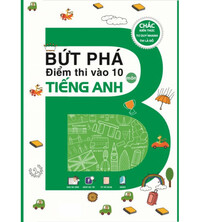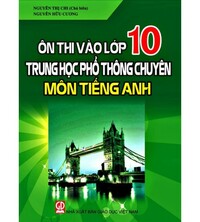Đề ôn thi vào lớp 10 môn Anh có đáp án
Thông qua việc giải từng Đề thi tuyển sinh lớp 10 môn Anh cụ thể trong bộ đề thi này sẽ giúp các em làm quen với cấu trúc đề thi, các dạng bài tập và nắm vững thêm các phần lý thuyết đã được học. Chúng tôi hi vọng, bộ đề này là tại liệu hưu ích dành cho các em học sinh. Chúc các em thi tốt với các Đề thi vào lớp 10 Tiếng Anh.
Đề thi tuyển sinh vào lớp 10 môn Ngữ văn năm học 2016 - 2017 Sở GD-ĐT Hà Nội
Đề thi thử tuyển sinh vào lớp 10 môn Tiếng Anh tỉnh Bắc Giang năm học 2016 - 2017
Đề thi thử vào lớp 10 môn tiếng Anh tỉnh Thanh Hóa năm học 2017 - 2018 Lần 2 (Đề A) có đáp án
Bộ đề thi thử vào lớp 10 môn tiếng Anh năm học 2017 - 2018 có đáp án - Số 1
Đề thi thử vào lớp 10 môn tiếng Anh năm học 2017 - 2018 có đáp án
I. Choose the word whose underlined part is pronounced differently from the others (0,5p).
1. A. thank B. they C. these D. than
2. A. walks B. cups C. students D. pens
3. A. talked B. watched C. lived D. stopped
4. A. stream B. leather C. cream D. dream
5. A. hour B. house C. hot D. head
II. Choose the word or phrase (A, B, C, or D) that best completes each sentence (2ps).
1. We used to.......... past the market on the way to school.
A. walk B. walked C. walking D. have walked
2. Remember to turn....... the light when leaving the office.
A. off B. on C. down D. in
3. Ho Chi Minh City is the.......... one in the country.
A. larger B. large C. largest D. largely
4. Lan is very tired. ________, she has to finish her assignment before going to bed.
A. Although B. So C. Therefore D. However
5. I suggest________some money for poor children.
A. raise B. to raise C. raised D. raising
6. Have you ever......... a letter to the local authorities to complain about the public transport in your town?
A. wrote B. writing C. written D. write
7. When are you......... vacation with your family, Lan?
A. on B. by C. with D. to
8. If you...... late, you wouldn't finish your work.
A. come B. coming C. to come D. came
9. Huong wishes she......... free time to visit her close friend in hospital.
A. to have B. had C. have D. having
10. I think I've lost my new hat. I've......... it everywhere but I can't find it.
A. looked out B. looked in C. looked on D. looked for
IV. Give the correct tense or form of the verbs in brackets (2ps).
a. Don't make noise now. My parents (take).. (1)............................. their usual afternoon nap
b. While I (have).. (2)............................. a bath, the telephone (ring).. (3)..................
c. He prefers (play).. (4)............... computer games to (read).. (5)............... books.
d. Don't forget (lock).. (6)................ the door before (go).. (7)............. to bed
e. I (write).. (8)............. to my panpel 2 months ago, but I (not receive)... (9)..................... his reply since then.
f. If we (not save)... (10).................. energy , there will be a shortage in the next century.
V. Read the following passage, then choose the correct answer to questions (1p)
Singapore is an island city of about three million people. It's a beautiful city with lots of parks and open spaces. It's also a very (1)______ city.
Most of the people (2)______ in high-rise flats in different parts of the island. The business district is very modern with (3)______ of high new office buildings. Singapore also has some nice older sections. In Chinatown, there (4)______ rows of old shop houses. The government buildings in Singapore are very beautiful and date from the colonial days.
Singapore is famous (5)______ its shops and restaurants. There are many good shopping centers. Most of the goods are duty free. Singapore's restaurants sell Chinese, Indian, Malay and European food, and the prices are quite reasonable.
1. A. large B. dirty C. small D. clean
2. A. live B. lives C. are living D. lived
3. A. lot B. lots C. many D. much
4. A. is B. will be C. were D. are
5. A. in B. on C. at D. for
VI. Read the passage and answer the following questions. (2ps)
Alexander Fleming was born in 1881 in Scotland. He went to a small school in a village, and when he left school he didn't go to university. He worked for five years in an office. But his brother, Tom, was a doctor and helped Fleming to go to university and study medicine. So he went to London University and in 1906 he became a doctor. In 1915, Fleming married Sarah McElroy, an Irish woman. They had one son. During the First World War, many soldiers died in hospital because they didn't have the right medicines. So after the war, Fleming tried to find a drug that could help them. He worked for many years and in 1928 he discovered a new drug and he called it "penicillin". He later worked with an Australian and a German scientist to develop a drug that doctors could use. In 1945, they won the Nobel Prize in medicine for their work on penicillin.
1. Where was Alexander Fleming born?
................................................................................................
2. Did he work in an office before he went to university?
...................................................
3. What did he study at university?
...................................................................................................
4. When did he win the Nobel Prize in medicine?
...................................................................................................
VII. Write a new sentence as similar as possible in meaning to the original sentence (2ps).
1. The girl is very friendly. She lived next door to us.
->The girl...................................................................................
2. It takes Minh 2 hours to do his homework every day.
->Minh spends..............................................................................
3. We were late for school because of the heavy rain.
->Because it....................................................................................
4. My mother used to make us clean the house.
->We used.......................................................................................
5. "I'm working in a restaurant, and don't care much for it." she said.
->She said.....................................................................................
6. It's two years since I last spoke to her.
->I haven't...................................................................................
7. Going swimming in the river in the summer is interesting.
->It is..........................................................................................
8. No one in my class is more intelligent than Lan.
->Lan is...................................................................................
Đề ôn thi vào lớp 10 môn tiếng Anh năm học 2017 - 2018
A. PHONETICS (1pt)
I. Choose one word whose underlined part is pronounced differently:
1. A. different B. world C. practiced D. disaster
2. A. pollute B. receipt C. species D. accept
3. A. clear B. bear C. hear D. near
II. Choose one word whose stress pattern is different:
4. A. promote B. attract C. trophy D. compete
5. A. develope B. introduce C. discover D. Prepare
B. Vocabulary and grammar (5pts)
I. Choose a, b, c or d that best completes each unfinished sentence(2pts)
1. You will not succeed .......................... working hard.
a. unless b. without c. if d. although
2. It was raining very ............. so I took my umbrella.
a. wet b. badly c. hard d. firmly
3. I .............. do that if I were you.
a. won't b. shan't c. wouldn't d. don't
4. You may borrow as many books as you like provided you show them to ............... is at the desk.
a. who b whom c. whoever d. which
5. I wish you ............. stop interrupting me whenever I speak.
a. did b. would c. might d. will
6. I wish I ........ more about the logistics of the expedition.
a. would know b. knew c. know d. can know
7. The little girl ............. when she fell.
a. hurt himself b. hurt herself c. has hurt d. hurt
8. Listen to what I am saying, ............................?
a. don't you b. do you c. did you d. will you
9. .................. this medicine, and you'll be well again.
a. Have b. Drink c. Eat d. Take
10. Yoko feels .................. again after her illness but she still cannot work ............. .
a. strong/ hardly b. strongly/ hard c. strongly/ hardly d. strong/ hard
II. Give the correct form of verbs in brackets: (2pts)
1. Listen to these students! What language they (speak) .......................?
2. What you (do) ............................. If you had a lot of money?
3. Did you advise Jane (join) .............................. in the Vietnamese speaking contest?
4. Who (carry) ............................. your bag when you climb Mount Phanxipang?
5. In Viet Nam, it (not snow) ............................. in winter except for Sa Pa and Lang Son.
6. We (always/ make) .................................. to work hard by our parents.
7. Their grandparents prefer (watch) ............................ basketball to playing ............................. it.
8. My friends (wait) ............................... for me when I got to the stadium.
9. Nothing (do) ................................ since he moved here.
10. To avoid (attack) .............................. again, the millionaire hired some guards.
III. Give the correct form of the words in the brackets (1pt)
1. Novelists are among the most _____ people in the world. (IMAGINE)
2. Secondary education is _____ and free in many countries. (COMPEL)
3. The song has _____ been selected for the Sea Games 22, Vietnam. (OFFICE)
4. . _____ are doing their best to make people aware of the danger of air pollution. (ENVIRONMENT)
5. Your father is a bit _____. I think he should go on a diet. (WEIGH)
C. Reading (2pts)
I. Read the passage then choose the best answer: (1pt)
Music influences people in different ways or the same person differently at different times. Music may seem to influence people differently. That is because people can react differently to the music. We are able to apply a choosing process to the music we hear. If someone hates jazz, then a jazz piece with a positive effect will probably not make him feel good. A happy song might appear to make an angry person angrier, yet it is not the music itself that is creating the anger; rather it is the positive effect of the music. The angry person does not want to accept the song's happy feeling: it points out his already existing anger, and makes that anger come to the surface. When a piece of music is played and we are listening to it, our body, mind, and feelings are being affected. The musicians of ancient cultures such as China, India, Turkey and Greece understood the effects of music. In fact, Pathagoras, in ancient Greece, introduced a whole science that concerned them. Because the musicians of these ancient cultures understood these effects, they created music that was positive, uplifting, and beneficial. Once the effects of music are better understood, the next step is to gain a better understanding of the music around us, and what effect it is actually having.
1. The text is about_____.
A. The science of music B. Understanding music
C. The effects of music on human feelings D. Music and an angry person
2. Music_____.
A. cannot be chosen B. affects everybody in the same way
C. affects us in different ways D. never make us angry
3. According to the text,_____.
A. Everybody likes jazz B. Jazz always makes us feel better
C. No one likes jazz D. a very angry person sometimes do not accept music
4. In ancient cultures, there used to be a science that concerned the effects of music in_____.
A. China B. India C. Turkey D. Greece
5. The word "Once" has a close meaning to_____.
A. on time B. when C. because D. if
II. Choose the best option to fill in each blank: (1 pt)
Environmental pollution is a term that refers to all the ways by (1).......man pollutes his surroundings. Man dirties the air with exhaust gases and smoke, contaminates the water with chemicals and other substances, and damages the (2) .....with too many fertilizers and pesticides. Man also pollutes his surroundings in various other ways. For example, people ruin natural beauty by scattering junk and litter on the land and in the water.
Environmental pollution is one of the most serious problems (3) .............. mankind today. Air, water, and soil are necessary to the survival of living things. Badly polluted air can cause illness, and even death. Polluted water kills fish and other (4) ....life. Pollution of soil reduces the amount of land that is available for growing food. Environmental pollution also brings ugliness (5) .......man's natural beautiful world.
1. A. that B. whom C. which D. whose
2. A. soil B. forest C. beach D. stream
3. A. faces B. faced C. to face D. facing
4. A. human B. marine C. animal D. plant
5. A. to B. on C. for D. in







